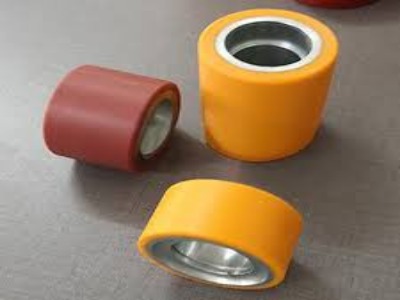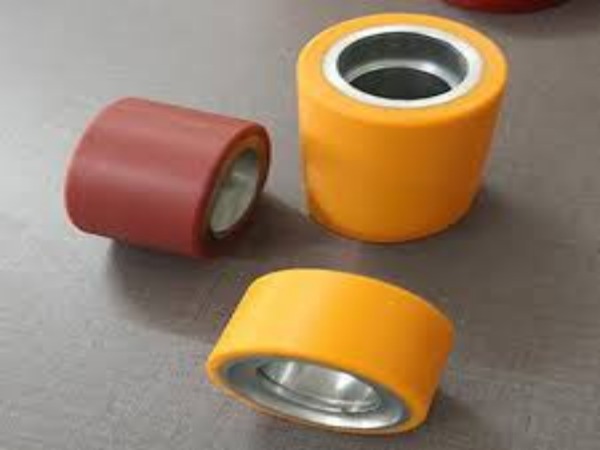No.19 Electronic Information Industry Park, Anfeng Town, Dongtai City, Jiangsu,China WhatsApp: +86 19941574218

Discover how polyurethane coated wheels and rollers enhance efficiency in the textile industry. Learn about their wear resistance, chemical tolerance, and applications in spinning, weaving, dyeing, and finishing.
In the modern textile and apparel manufacturing chain, smooth and efficient material handling is critical. From fiber spinning to fabric dyeing and garment production, materials must be transported precisely over countless rollers and wheels. In this process, polyurethane coated wheels and rollers play an indispensable role. Their superior performance makes them a key component for boosting productivity and ensuring high product quality.

Why Choose Polyurethane Coated Wheels for Textile Applications?
Compared to traditional materials like rubber, metal, or plastic, polyurethane coated rollers offer distinct advantages that meet the stringent demands of the textile industry:
Exceptional Abrasion Resistance & Long Service Life: The textile mill environment subjects equipment to constant friction from fibers, yarns, and fabrics. Polyurethane's extreme wear resistance significantly extends roller life, reducing downtime and maintenance costs.
Excellent Elasticity & Cushioning: Polyurethane's versatile elasticity provides necessary support while effectively absorbing shocks and vibrations. This protects delicate materials like silk and microfibers from scratches, marks, or distortion.
High Load-Bearing Capacity: Even under heavy loads, polyurethane wheel maintain their shape and performance without permanent deformation, ensuring stable handling of heavy fabric rolls or dense yarns.
Superior Chemical Resistance: Processes like bleaching, dyeing, and finishing involve acids, alkalis, and various chemical agents. Polyurethane resists most industrial chemicals, preventing failure from corrosion or swelling.
Customizable Hardness & Superior Grip: Polyurethane hardness (e.g., Shore A 50°-95°) can be tailored. Softer coatings provide greater friction to prevent slipping, while harder ones offer precision for positioning applications.
Smooth & Quiet Operation: Polyurethane coatings dampen noise and vibration, creating a better work environment and minimizing interference with precision machinery.
Key Applications in the Textile and Apparel Production Line
The use of polyurethane rollers spans the entire supply chain:
1. Spinning and Winding
Yarn Guide Rollers/Wheels: On high-speed winders and doublers, these rollers ensure uniform yarn tension, reducing fuzz and breakage.
Grooved Drums: The polyurethane coating on winding drums is wear-resistant and anti-static, guaranteeing neat and tight yarn packages.
2. Weaving
Loom Guide Rollers: On high-speed looms (water-jet, air-jet), these rollers guide warp and weft yarns. Their water and chemical resistance is crucial here.
Fabric Take-up Rollers: These rollers provide uniform pressure and excellent grip for winding woven fabric, preventing loose rolls or slippage.
3. Dyeing and Finishing (The Most Extensive Application Area)
Dyeing Machine Guide Rollers: Inside high-temperature, high-pressure dyeing machines, these rollers withstand heat, moisture, and chemicals, ensuring fabric circulates smoothly without streaks or chafe marks.
Printing Machine Blanket Rollers: In rotary or flatbed printing machines, these rollers support and drive the printing blanket. Their precision ensures accurate pattern alignment.
Stenter & Tenter Frame Rollers: During heat setting, these rollers withstand temperatures above 200°C while maintaining elasticity to prevent curled edges and wrinkles.
Padder Rolls: When fabric is padded with chemicals or softeners, polyurethane rolls ensure uniform pick-up and are corrosion-resistant unlike metal rolls.
4. Garment and Home Textile Manufacturing
Material Handling Wheels: Used on carts for moving fabric boxes, yarn creels, and finished goods. They are durable, floor-friendly, and quiet.
Sewing Equipment Feed Wheels: On automated sewing units, these wheels ensure precise fabric feeding for consistent stitching.
Conclusion
Polyurethane coated wheels and rollers, though not the most visible components, are vital to the production of every meter of yarn and fabric. By providing reliable, efficient, and gentle material handling, they help textile and apparel companies guarantee product quality, improve operational efficiency, and reduce total cost of ownership. Investing in high-quality polyurethane coated rollers is a solid insurance policy for the smooth and profitable operation of any modern textile plant.
Mailun's polyurethane wheels for large-scale printing presses, made from polyurethane and featuring customized services, provide the printing industry with key components that are highly elastic, wear-resistant, and adaptable, helping companies improve production efficiency and print quality. Filson also offers related polyurethane rollers for heavy-duty material transport, AGVs, and RGVs.
Direct‑fit polyurethane wheels for pallet jacks: 1–3 t load range, superior tear & aging resistance, quieter operation and reduced maintenance.
Polyurethane-coated wheels are the core component for AMR (Autonomous Mobile Robot) stability—offering high load capacity, 3-5x wear resistance vs rubber, wide temp adaptability, and low noise.
Specialized industrial wheels and casters for semiconductor manufacturing: ensuring cleanroom purity, vibration-free stability, and heavy-load efficiency for maximum chip yield.
Industrial wheels for chemical & pharmaceutical industries: Essential for heavy-duty load capacity, chemical resistance, cleanroom compliance, and operational safety in demanding production environments.